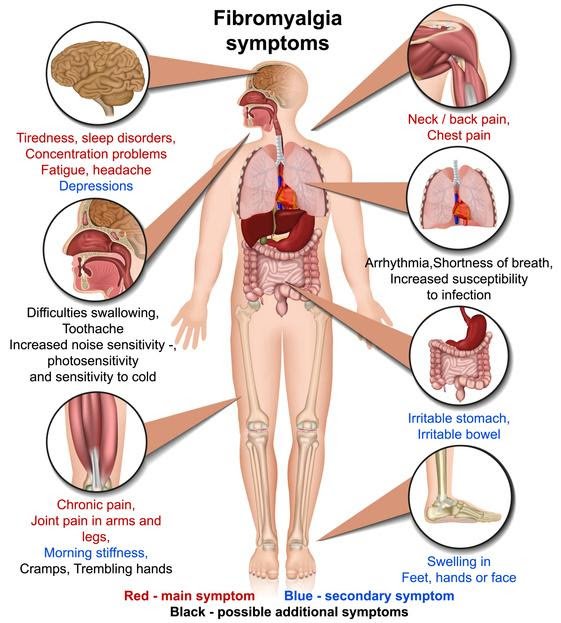Is CBD Effective in Treating Fibromyalgia?
Yes! Research indicates that CBD can alleviate many of its symptoms
By Dan Reich
Fibromyalgia is a complex musculoskeletal disorder characterized by widespread pain that can present as sharp or achey with amplified pain sensations. It is estimated that 2% to 4% in the general population suffer from it and it’s much more common in women than men.
Other fibromyalgia symptoms can include chronic fatigue, sleep disturbances, cognitive issues (such as “brain fog”) and mood irregularities. Fibromyalgia symptoms can mimic autoimmune disease symptoms, but it is not considered an autoimmune or inflammatory condition.
It is, as of now, unclear what causes fibromyalgia, although most research has pointed to the central nervous system, in particular the regulation of pain sensations, as a possible cause. A novel theory has emerged, however, from Dr. Ethan Russo, a neurologist and psychopharmacology researcher who believes it may lie with the endocannabinoid system, or ECS. The ECS is the body’s natural system of endocannabinoids and receptors that regulates a wide variety of the body’s functions and helps the body maintain a state of balance referred to as homeostasis. It manages chronic pain, inflammation, mood, learning and memory, sleep and more. Problems with each of these are frequently helped by CBD, so this theory suggests that CBD could be effective in addressing fibromyalgia’s set of symptoms, as well as the underlying cause.
Dr. Russo has theorized that an overwhelmed endocannabinoid system could result in the array of symptoms reported by fibromyalgia sufferers. In his view, a cannabinoid such as CBD might turn out to be an effective way to reboot the ECS and treat the underlying cause of fibromyalgia instead of simply treating each of the systems, as is the case with conventional medicine.
Because there is such a diverse set of symptoms, most conventional treatments involve the use of various pharmaceuticals to treat each symptom, which often consists of pain relief medications (including opioids) antidepressants, nerve blockers and sleep aids. Some doctors also add such non-pharmaceutical approaches such as tai chi, acupuncture, massage and meditation in an effort to provide relief. Exercise is also generally recommended.
Several studies have explored whether CBD and THC can play a role in mitigating the effects of fibromyalgia. One of the first of these, a Canadian study in 2010, found that a synthetic form of THC improved sleep in the majority of fibromyalgia patients, but had little effect on other symptoms. A study in 2011 reported that 81% of participants’ sleep improved, leading to a better quality of life. A 2017 study built on these findings, with participants expressing the following on their experience:
• “It lets me live a more productive life and a more fulfilling one”
• “It gives me the ability to function throughout the day”
• “I am more active and able to do things I want”
• “Distracts me from the pain and dwelling on negative thoughts”
• “I can think more clearly”
A turning point in the research appears to be a fibro-cannabis study from Israel in 2018 that showed all of the participants found improvement in symptoms from cannabis use and more than half ceased taking other medications. This is significant because most were taking multiple medications for the various symptoms, and many of these were opioids, anticonvulsants or other relatively intense medications.
More recent research seems to support Dr. Russo’s theory that an ECS deficiency is at the root of fibromyalgia. A review of clinical and preclinical research into cannabinoids, the ECS, and fibromyalgia in Pharmacology & Therapeutics (December 2022), agreed that “there is evidence for alterations in the endocannabinoid system in patients with fibromyalgia.” Furthermore, a review and analysis of eight studies investigating the benefits of cannabinoids for chronic pain in Pain and Therapy (December 2022) reported that “cannabinoids might improve pain and quality of life in patients with fibromyalgia.” Yet another review, also in Pain and Therapy (January 2023) on the efficacy, risks, and benefits of cannabinoids in the treatment of various pain subtypes concluded that “available data strongly support the use of cannabinoids in treating fibromyalgia pain” due to “overwhelmingly positive treatment results.”
This recent data suggests that cannabis, whether CBD or in combination with THC, is a single treatment methodology that can replace multiple medications that have up to now been used to treat the disparate symptoms of fibromyalgia. And more importantly, by working directly with the ECS, the cannabinoids of cannabis have great promise in treating the underlying cause of fibromyalgia.
Fibromyalgia protocol:
Here at Synergy Wellness, we found CBD is best for inflammation and THC is best for pain. The initial protocol we recommend for fibromyalgia symptoms are our Indica blend CBD-rich tinctures #103/104/105 (alcohol/olive oil/ sesame oil infusion) in a 4:1 CBD:THC ratio, which generally provides significant relief. If pain symptoms don’t respond to the 4:1 CBD:THC ratio, then a recommendation of our next stronger tinctures Balance #154,155,156 (alcohol/olive oil/sesame oil infusion), a 1:1 CBD:THC for chronic pain. Start with 5-7 drops and titrate slowly up to 30 drops.
In Memoriam: Raphael Mechoulam Organic Chemist, Cannabis Pioneer 1931-2023
by Billee Sharp
The international cannabis community is mourning the passing of Raphael Mechoulam on the 9th of March 2023 at the age of 92. Widely recognized as the Grandfather of Cannabis Research, Mechoulam was the first to isolate the active compounds, THC, CBD and CBG and later led the team that discovered the endocannabinoids Anandamide and 2-AG . Anandamide comes from the Sanskrit word Ananda because there is not a good word in Hebrew for bliss. Mechoulam’s work laid the foundation of cannabinoid research which led to the discovery of the human Endocannabinoid System (ECS).
Mechoulam started researching cannabis in Israel in the 1960’s, he chose cannabis as his research topic because he had a tiny budget to work with and cannabis was not being studied anywhere else. He was aware that cannabis had been used therapeutically for thousands of years to treat many conditions and was still widely used in the U.S. in the early twentieth century, only being removed from the American Pharmacopeia in 1940.
In 1963 when he isolated Cannabidiol (CBD) Mechoulam decided to study the effects of CBD on epilepsy patients. The choice of epilepsy was a hunch Mechoulam had from reading a 15th century Arabic text which told the story of a prince who suffered from epilepsy; a doctor brought him cannabis which cured him, the only caveat was that the prince would have to take the medicine for the rest of his life.
The first CBD clinical trials were undertaken using mice, their epileptic seizures stopped while taking the CBD medication. In 1980 Mechoulam’s team went to Sao Paulo, Brazil to undertake human epilepsy clinical trials: the participants all had severe epilepsy which wasn’t responding to any other treatments. The patients were given a high dose of 200mg CBD daily and all participants experienced cessation of seizures, most participants became seizure-free while some experienced significant reduction in seizures.
In recent years Mechoulam continued to research and his team have just unveiled the final legacy of his work. EPM301 is a cannabidiolic acid methyl ester which is a secondary substance which occurs after the primary acid cannabinoids have been decarboxylated ( heated to 200˚C). Esterification creates a stabilized form for scalable production and is also significantly more potent than the primary cannabinoids. EPM301 has been approved for clinical trials in the U.S. for Irritable Bowel Syndrome (IBS), Psoriasis and Acute Respiratory Distress Syndrome (ARDS).
Mechoulam’s final project may be the key to cannabis medication finally entering the pharmaceutical domain and becoming widely accessible. It is also said that, of all his discoveries, the discovery of EPM301 is his most significant and will have the greatest impact towards creating a new approach to healthcare. At 90 years of age, he was still a pioneer, setting an example for aging with grace.
Throughout his long and remarkable career Mechoulam has supported cannabis research, co-founding both the International Cannabis Research Society and the International Association for Cannabinoid Medicines. He has been honored by many Universities and won many awards including the esteemed Harvey Award.
Mechoulam’s scientific work led the way for the shift in perspective where cannabis began to be seen as a medicinal plant rather than a recreational drug.
Many now hope that all of his incredible achievements will see Mechoulam posthumously awarded the Nobel Prize.


